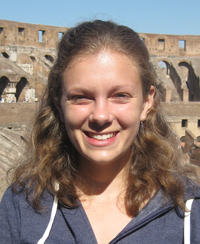Alumna Awarded INFORMS Prize for Terrorist Network Research
September 25, 2012Alice Paul ’12 of Madison, N.J., has been awarded the 2012 Undergraduate Operations Research Prize for her senior thesis on detecting terrorist networks.
The award, given by the Institute for Operations Research and Management Sciences (INFORMS), honors students who conduct important theoretical or applied research in operations research or management science while enrolled as an undergraduate.
Paul will receive a $500 prize, plus a travel stipend to attend and present her findings at the INFORMS annual meeting, Oct. 14-17 in Phoenix.
“This award gives me a great boost of confidence, and I’m excited about the opportunity to present at the INFORMS annual meeting,” said Paul. “Operations research excites me not only because it has a beautiful theory but also a wide array of applications. It merges everything I love about math, computer science and engineering.”
Paul’s thesis, “Detecting Covert Members of Terrorist Networks,” uses mathematical modeling to analyze communication between members of a covert organization with the goal of locating—and intercepting—its leaders. She modeled the organization as a social network in which the nodes are its members and the edges between nodes represent their connection by some form of direct communication.
“By targeting and isolating certain vertices in the organization, the set of possible communication paths can be altered to reroute the communication,” said Harvey Mudd College Associate Professor of Mathematics Susan Martonosi. “Our objective is to determine which vertices to target to force secretive members of the organization to engage in more communication and, therefore, be more easily intercepted.”
Paul is one of more than 30 students to have worked with Martonosi, whose research focuses on using operations research models and methodology to address homeland security issues. Winning the INFORMS prize was significant, since Paul had not taken an operations research course—which emphasizes the mathematical techniques she used in her thesis—until her senior year.
“Most of the techniques she used she taught herself months before seeing them in her classes,” Martonosi said.
The alumna is now pursuing her doctorate in operations research and information engineering at Cornell University.

